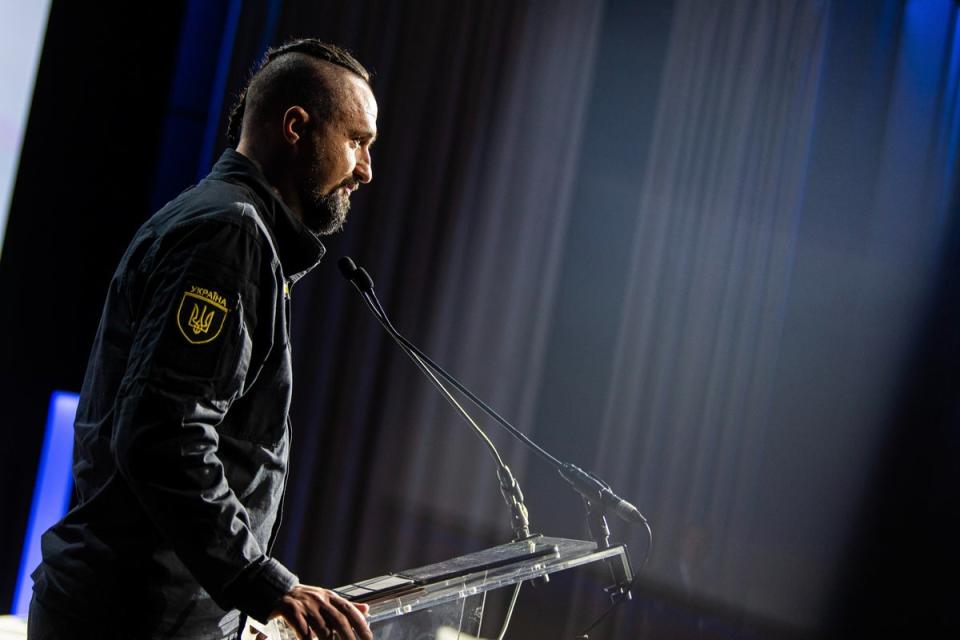For months, Oleksandr Kamyshin led Ukraine’s push to dramatically increase its production of drones, one of its most important weapons in the fight against Vladimir Putin’s invasion.
Used to strike Moscow’s forces across Ukraine – and into Russia – Kamyshin was at the forefront of upping the supply of drones in his role as minister for strategic industries and so strengthening Kyiv’s arsenal.
Now he faces a different battleground. Trying to prevent Moscow’s moves to lift its ban from the world chess community, as president of Ukraine’s chess federation, while also advising President Volodymyr Zelensky.
After Moscow’s forces barrelled into Ukraine in 2022, Russia and its ally, Belarus, were ejected from many international organisations including Fide, the International Chess Federation, the body governing and promoting the game and overseeing the most prestigious competitions.
Although Russian and Belarusian players are allowed to compete in events organised by Fide, the anthems of their countries are not played and they must use the Fide flag instead of their respective nations’ banners.
That has been a humiliating setback for Russia, which has always prided itself on its prominent role in the world of chess. Now Moscow plans to regain membership of the body at its general assembly conference in Budapest on Sunday
The former Soviet republic of Kyrgyzstan, seen by Ukraine as a Putin pawn, initiated Moscow’s comeback gambit by placing a motion to lift all sanctions against Russia on the conference agenda.
Kamyshin is traveling to Budapest to lead Ukraine’s response to Kyrgyzstan’s move and stall Russia’s game plan. He says: “Kyrgyzstan put a point on the agenda to give Moscow back full rights – which means they can have the Russian anthem, Russian flag in international competitions; it means they would be free to hold Fide events in Russia and Belarus. I don’t believe this should happen in the civilised world.
“Even having that item on the agenda and bringing it to a vote is disrespectful and ignores what the Russians are doing in Ukraine,” he adds. “At least 21 Ukrainian Chess Federation members have died fighting against the Russian invasion and two are in captivity. For us it’s important that no Russian, no Russian flag get back in the world arena until they stop the unprovoked war in Ukraine.”

Kamyshin says that Russia has been kicked out of international organisations and forums because of its actions in causing Europe’s largest conflict since the Second World War and he hopes that enough Fide members will realise lifting the ban on Moscow would make the body “toxic.”
Ukraine is also considered as one of the world’s most important chess-playing nations and has produced plenty of champions. Ahead of Sunday’s conference 13 of Ukraine’s top players have called for the global chess community to oppose plans to lift the ban. They have sent Fide a letter in which they say restoring Russia’s rights would be “premature and deeply immoral given the ongoing circumstances… We respectfully urge you to ensure that this topic is not even placed on the agenda for discussion.”
It’s been a dizzying few weeks for Kamyshin, who was CEO of Ukraine’s railways when Moscow launched its full-blown war against his country and gained praise for keeping the trains running on time despite the myriad problems caused by the conflict.
Zelensky then appointed Kamyshin minister for strategic industries with responsibility for the country’s vital industries, particularly defence, and to ensure its development in harmony with EU and Nato standards.
Kamyshin’s reputation for getting the job done increased at home and his impressive style of speaking and outgoing manner have won him respect among Ukraine’s political allies abroad.
Just a few days after Kamyshin was elected president of the Ukrainian Chess Federation, at the end of August, Zelensky asked him to become one of his advisers – seen as one of the most important roles in the administration.
Kamyshin says he has been a chess enthusiast since childhood, when he was taught to play by his parents. “I went to a good school that taught pupils to play chess and I played in local competitions. I’ve encouraged both my sons, now aged 10 and 14, to play chess from when they were five years old and we constantly play together.”
He says chess doesn’t dominate his approach to jobs he has taken on but says “chess makes you more successful, smarter and stronger and mastering the game will help anyone.”
“In your life you learn many lessons and you never know which one of those will help you at the next level,” he says. “Chess helps you distinguish between quality and quantity; to understand complex things. Chess, sports, strategy, books, all these experiences and pieces of knowledge come together to enable a ‘gut feeling’ about challenges and so chess has been an important ingredient in my life,” he adds.
Kamyshin wants to create conditions for his country to return to the top tiers of world chess by getting more Ukrainians, especially young people, involved in the game. “I want more people playing chess, more competitions happening and to build a system that will eventually produce more world-class champions,” he says.
“But before making them champions, chess will help make kids much more ready for real life,” he adds. “Chess is good for your life, chess helps you every day. Whether you become a champion or not, chess will make you stronger in your daily life, in your career, in your business. So that’s the real goal for me, I want my country to become stronger and smarter.”

